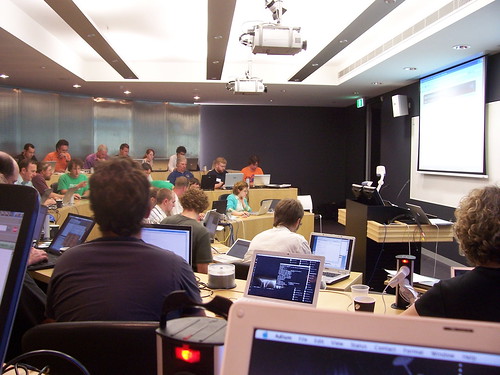Assorted thoughts and reflections on technology in education, and other things ...
Friday, September 12, 2014
Should we ask students to switch off their devices?
I got a bit of a shock when I read a new article by Clay Shirky, one of the most high profile advocates of the digital revolution, about his decision to ask students to switch off their devices in class, Why I just asked my students to put their laptops away. Up till now such an idea has been dismissed as a sign of the teacher's hostility to technology and that it is the teacher's responsibility to make the class time as engaging as possible to keep students involved and to counter multitasking. However the issue of multitasking and distractions is more insidious and even one of the leading authorities in social media has to take a step back.
The problem is that today's social media and devices are simply too compulsive. Even with the best will in the world to concentrate on one thing at a time we can't stop ourselves from quickly checking what's going on out there, especially with the presence of all forms of alerts to lure us in. Another factor is the myth that multitasking shows that we are effective workers and that sitting in a meeting or class simply listening is an admittance that we have nothing else we need to do.
People often start multi-tasking because they believe it will help them get more done. Those gains never materialize; instead, efficiency is degraded. However, it provides emotional gratification as a side-effect. (Multi-tasking moves the pleasure of procrastination inside the period of work.) This side-effect is enough to keep people committed to multi-tasking despite worsening the very thing they set out to improve.
Every time your attention strays to check an update or answer an e-mail you lose something else. You may think you're still listening to what is going on in the room but even if you follow the gist you are unable to reflect or grasp the nuances. While it is true that we have always had distractions in classrooms when things get boring such as writing messages on bits of paper, today's distractions come with graphics, sound and video and are always going to trump whatever goes on in the room.
The form and content of a Facebook update may be almost irresistible, but when combined with a visual alert in your immediate peripheral vision, it is—really, actually, biologically—impossible to resist. Our visual and emotional systems are faster and more powerful than our intellect; we are given to automatic responses when either system receives stimulus, much less both. Asking a student to stay focused while she has alerts on is like asking a chess player to concentrate while rapping their knuckles with a ruler at unpredictable intervals.
So what's the solution? Here in Sweden our education minister has proposed to ban mobiles in the classroom to counter multitasking but that seems to be missing the point completely. We all need to learn how and when to use technology and when to switch it off. In classrooms and meeting rooms there are times when the teacher or leader of the meeting is perfectly entitled to ask everyone to switch off because this task requires full concentration. It's like having the door or windows open - it's nice to hear and see what's going on outside but when you need to concentrate it's sometimes best to close the door, shut the window and maybe even pull down the blinds in order to concentrate.
Attention is a vital skill to learn. If we can't focus very little gets done. But that doesn't mean banning devices; it means learning to use them wisely and becoming aware of the irresistible lure of the sirens' cry.
Subscribe to:
Post Comments (Atom)

I agree! This is an important but rather delicate issue.
ReplyDelete